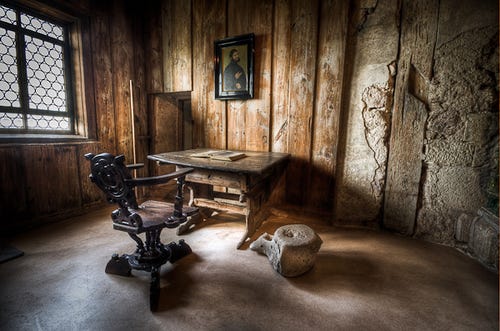Dispatch from Wartburg
As I lamented with a colleague my recent booklist, she made the observation that I had read little to no biographies in 2009 and ought to amend that for 2010. Taking her advice, I pulled off the shelf a 300-page biography on Martin Luther. Thus, in this first post of 2010, rather than critique something (as I am usually wont to do), I thought I'd share a few thoughts and quotes from my Christmas break reading. I hope they're encouraging as you start the new year in earnest this week.
The good thing about James Kittelson's Luther the Reformer is that it is an enjoyable and theologically astute biography with a balanced approach to a man often caricatured as "unbalanced.” Make no mistake, Luther was no saint, but he lived very consistently, and Kittelson early and accurately identifies so much of what drove Luther to be the Reformer we know him to be in a way as human as it is theological:
"Luther discovered that true religion was far more than just the proper inclination of the heart and earnest attempts to work out his salvation. But every time he tried to fan his own spark of goodness, he found that all he was doing was focusing his attention on himself. From his own teachers, he knew that to think of himself was to be in his most sinful state. How then could he 'do what was within him' without yielding to the basest of motives, the desire to save his own skin? How could he possibly confess every one of his sins when he knew that he did so only for the purpose of currying the favor of a righteous God who would surely condemn him for them? Every act of confession therefore became yet another sin. The sincerity of the confession and of the acts of penance that followed was always in question. And if he himself questions his motives, how could they not have been more than dubious in the mind of a God who knew all and was always right?" (80)
The book is filled with original quotes from Luther, many of the ones below I resonate with in a deep and desperate way. Here are three which particularly struck me:
"Learn Christ and him crucified; despairing of yourself, learn to pray to him, saying, 'You, Lord Jesus, are my righteousness, but I am your sin; you have taken on yourself what you were not and have given me what I was not.' Beware of aspiring to such purity that you no longer wish to appear to yourself, or to be, a sinner." (95)
"For it cannot be that a soul filled with its own righteousness can be replenished with the righteousness of God, who fills up only those who hunger and are thirsty. Therefore, whoever is full of his own truth and wisdom is not capable of the truth and wisdom of God, which cannot be received save by those who are empty and destitute." (99)
"The Christian life does not consist of being but of becoming, not of victory but the fight, not of righteousness but of justification, not of comprehending but of stretching forward, not of purity but of purification." (109)
In chronicling Luther's life, Kittelson is particularly insightful of both Luther's historical context of Roman Catholic corruption and God's use of him within it:
"Luther had developed a way of understanding the Christian life that utterly contradicted what he, and everyone else in his day, had been taught. He flatly denied that there was any possibility of becoming genuinely better in the presence of God. As time passed, Christians could hope only to become ever more radically dependent on the righteousness of God in Christ." (99)
In addition to the encouragement taken from the above passage, I took to heart the orator Mosellanus' description of Luther below:
"In his manner and bearing, he is very polite and friendly and has nothing of stoic severity or crabbiness about him; he comports himself well at all times. People chide him about only one failing, that in rebuttal he is somewhat more intense and biting than is appropriate for someone who wants to open new paths in theology and be regarded as taught by God." (145)
Ahem. Moving on, here's Luther on the concept of will:
"The human will is like a beast between [God and Satan]. If God sits on it, it wills and goes where God wills to go...If Satan sits on it, it will and goes where Satan wills. Nor does it have the power to choose which rider it will go to or seek, but the riders struggle over which of them will have it or rule it." (206)
On education (Luther, after all, was a professor as well as a theologian and pastor):
"If I could leave the office of preacher and my other duties, or were forced to do so, there is no other office I would rather have than that of schoolmaster or teacher of boys. For I know that next to the office of preaching, this is the best, the greatest, and the most useful there is. In fact, I am not absolutely certain which of the two is the better." (248-249)
And finally, with regard to depression and the importance of community (and despite my introverted preferences to the contrary, curse him):
"Satan delights in the solitude of Christians." (251)
While we in the Presbyterian branch of Protestantism often align ourselves more with Calvin than Luther in areas of systematic doctrine, church government, and the sacraments, if you haven't read any Luther lately, it might do your "frozen chosen" heart good to slip in a biography in 2010. It's done mine good in starting off the year.




